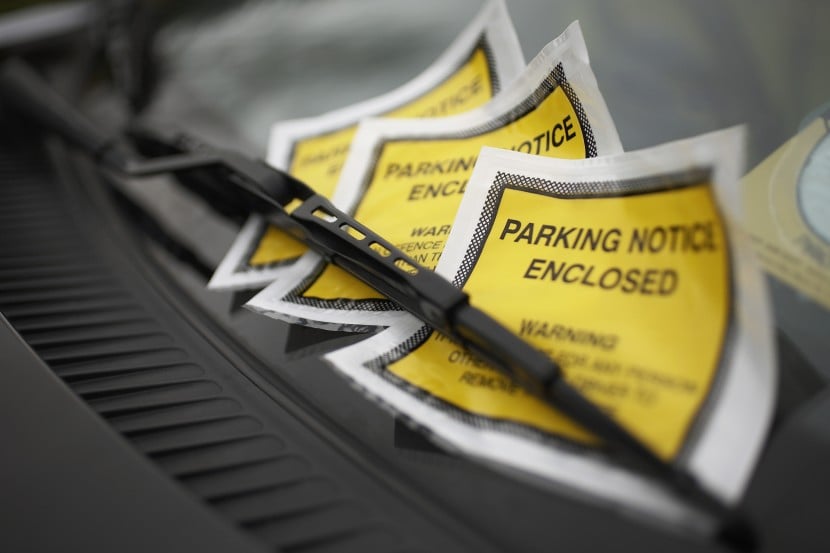Parking is changing in the UK. There's a new government app that's aimed at making parking simpler for people. It also saves you downloading another 1 of the 30 existing apps, zapping your phone's storage.
But with the technology shifting towards more app-based payments, there's more opportunity for scammers to strike.
In this guide, we'll look at how to avoid these scams and look at how the new app could help motorists. We'll also cover general parking rules that are essential for avoiding a parking fine.

Parking scams almost double in a year
Quishing
There's no doubt that apps are becoming the main way to pay for parking. This means there's definitely more opportunity for scammers.
Quishing is on the rise. This is where fraudsters place a fake QR code (that's why it's called quishing) on the parking terminal.
When you scan the QR code, it takes you to a site where you enter your payment details. Some of these websites are sophisticated, so it's likely to be a convincing copy of a regular car parking site.
Once you've entered your details, you're pretty stuck. Not only have you paid the fraudsters, but it's likely you'll get a parking fine too.
A 71-year-old woman in Thornaby Station car park has ended up losing £13,000 to a scam like this.
Last year, the UK's Action Fraud received 1,386 reports of scams involving QR codes. That's more than double the amount from the previous year.
Chris Ainsley, the head of fraud risk management at Santander UK, says:
“Unless drivers receive a parking ticket, a lot of people are unaware that their personal or card details were compromised in this way. When it comes to reporting the eventual scam, often the fact that it originated through quishing goes undocumented.”
Fake PCN text messages
Some scammers send fake penalty charge notice texts too. These claim that you owe money or penalties for parking. Usually, these have a link where you input your personal information.
How to avoid parking scams
If you're at a car park, be suspicious of QR codes on payment machines or signposts. You should also check that it's not been stuck over a legitimate code.
If there's an app option, use the app if you have it already or download it from your app store.
If you can't do either of these, use cash or card to pay.
If you do have to use a QR code, then make sure you check the URL. It should include HTTPS rather than HTTP. Also look for spelling errors on the site itself. If it looks strange at all, leave the site.
It's always a good idea to report any suspicious payments to your bank. And if you've noticed a scam like this in your local car park, report it to the council or car park owner if it's private.
Usually PCNs are sent on paper and include instructions on how to pay or appeal it. So be wary of any text claiming you have a PCN.
Check the phone number. Avoid anything that has an unknown phone number. Also look for unusual URLs in the text message, if it's shortened or suspicious, don't click it.
If you're at all suspicious, call the company that owns the car park. They can confirm if you have a parking fine or not.
If you think you've received a scam text, forward the text to 7726.
A 'one size fits all' parking app aims to make parking simpler for drivers
We've all pulled up at a car park and either fumbled about to find the right change or tried to work out which of the 30 (yes, really!) parking apps we need to download to pay.
Frustrating, isn't it? Well, the government is collaborating with the British Parking Association and popular parking app manufacturers like JustPark, PayByPhone and RingGo to develop the National Parking Platform (NPP).
This is a 'one size fits all' app that should work at 'participating' car parks. The announcement mentions that it'll come at no cost to the taxpayer, so that's nice too.
The government isn't launching another app that you need to download, you can use your preferred app to park as long as it's approved. According to Auto Express, the top parking apps are:
- AppyParking
- RingGo
- JustPark
The parking sector is working with councils to run the platform on a not-for-profit basis, and there are clear terms it needs to follow. According to the government, the NPP should be 'transparent, sustainable and have value for the public'. The government will keep a close eye on this and make sure the sector's following these terms.
So far, the app has been rolled out in 10 local authorities. These include:
- Manchester
- Liverpool
- Peterborough
- Coventry city councils
- Oxfordshire County Council
Around 476 locations in these 10 council areas are using the app. It handles over half a million transactions a month.
The next steps for the initiative are onboarding more local authorities. But this could take some time, as connecting up thousands of council and privately owned parking sites into 1 system is a big task.
Minister for the Future of Roads, Lilian Greenwood, said:
"This government is on the side of drivers and dedicated to giving everyone simpler, more flexible parking. I’m delighted that this fantastic project is being taken on by the parking sector with no extra cost to taxpayers."
The NPP is part of the government's Plan for Change. Currently, the government has invested £1.6 million to tackle potholes and improve infrastructure for drivers as part of the plan.
Andrew Pester, BPA Chief Executive, said:
"Today’s announcement marks the result of 6 years of dedicated work by our parking sector to make paying for parking easier. We’ve strongly supported the National Parking Platform from the start, so we’re thrilled with this outcome and excited to collaborate with the Department for Transport and the new NPP company to create a better parking experience for all drivers."
18 places you can't park
The Highway Code lays out 18 places where you can't park:
-
Near a school entrance
-
Yellow lines in some circumstances
-
Where the kerb is lowered to help people with disabilities
-
On a cycle track
-
Anywhere that might prevent access for emergency services
-
At or near a bus or tram stop, or taxi rank
-
On a bend
-
On the approach to a level crossing
-
Opposite or within 10 metres (32 feet) of a junction, except in an authorised parking space
-
Near the brow of a hill or hump bridge
-
In a taxi bay as indicated by upright signs and road markings
-
Opposite a traffic island or another parked vehicle, if this would cause an obstruction
-
Where you might force other traffic to enter a tram lane
-
In front of an entrance to a property
-
Where you might obstruct cyclists’ use of cycle facilities
-
On the carriageway, an emergency area or a hard shoulder of a motorway except in an emergency
-
On a pedestrian crossing - this includes the area marked by zigzag lines
-
On a clearway
-
On an urban clearway within its hours of operation, except to pick up and drop off passengers
Is parking free on bank holidays?
Not all parking is free on bank holidays. Unless the sign expressly says that restrictions don’t apply on bank holidays, you should assume they do.
In case of local authority car parks, you could check the relevant section of the council website in advance. They should say if regulations are suspended at any particular time.
Any council that enforces parking rules on bank holidays is likely to have at least some traffic wardens working on those days to issue charges if necessary.
Can I park on the pavement?
In most places, you can park on the pavement, but it depends on where you are. An increasing number of areas are introducing pavement parking bans.
For example, it's illegal to park on the pavement in London.
In Wales, it's up to local authorities to enforce pavement parking bans if they apply. Scotland introduced a nationwide ban on pavement parking in December 2023.
The penalties for parking on the pavement depend on whether the rules are enforced by the council or the police.
If it's the council, you might get a PCN. If it's the police, you could get a fine and points on your licence.
You should also watch out for dropped kerbs. Blocking these could lead to a fine as these are important for wheelchair users to cross the road.
Residential parking rules and how to apply for a permit
What are the UK residential street parking laws?
Unless there’s a sign saying otherwise, you should be able to park on a residential street. This is as long as:
- You’ve not stopped on white, yellow or red lines
- You aren’t blocking pedestrians from using the footpath
Road markings are used to create parking spaces for residents, typically in flats near town centres or other popular parking spots. To park your car in one of these locations, you need to apply for a parking permit.
How do I apply for a residential parking permit?
You can apply for a residential parking permit through your local council’s website.
There are 2 types of parking permit:
- Resident permits
- Visitor permits
These are usually limited to 2 resident permits and 1 visitor permit per property.
Some properties might not be entitled to a permit, as restrictions apply. Your local council should have more information on these restrictions.
If you’re illegally parked in a residential area during the hours of operation you could face a PCN.
Is it still legal for private companies to clamp cars?
No - wheel-clamping by companies on private land has been outlawed in England and Wales since 2012. In Scotland, it’s been an offence for more than 25 years.
The police and the DVLA can still clamp cars on private land and public highways if it doesn’t have valid tax or insurance.
Your local council can clamp your vehicle and sometimes remove it if:
- It’s breaching parking restrictions
- It’s blocking a road
They can also remove your car if it’s broken down.
Private parking firms and guidance on parking
Private car parks can’t issue fines. Instead, they can send parking charge notices, which are payment requests for breaking their rules. These can be taken to court under contract law. Whereas council car parks can issue fines called penalty charge notices, which are backed by law.
Key difference: fines vs charges
| Council car parks | Private car parks |
|---|---|
|
Issue Penalty Charge Notices (PCNs)
|
Issue parking charge notices (contract claims)
|
|
Legally enforceable by law
|
Governed by civil contract law
|
|
Handled through councils and Traffic Tribunals
|
Handled privately or in court
|
If you’re parking in a private car park, it’s a good idea to follow this guidance:
- Look out for signs that clearly state the rules of the car park you’re in and follow them. For example, park within the bays and stay for the amount of time you’ve paid for.
- Don’t bend the rules just because you can’t see any enforcement. Firms often use cameras to monitor private car parks.
- If you get a parking charge notice and you think it’s unfair you can challenge it. You’ll need to gather evidence from the car park before leaving though.
- If your car has been clamped in a car park with no bylaws displayed, call the police.
No-one should demand money from you on the spot, or ask you to pay in cash. If this happens, drive away and call the police. Parking companies usually ask for payment by post or by credit or debit card at a later date.
Is it illegal to park in a disabled bay in a supermarket?
Parking in an official council-run disabled bay without a blue badge could result in a PCN. But doing so in a privately run car park, such as at a supermarket, is more of a grey area.
Operators might ask motorists who wrongly use disabled bays to move and they can also issue fines.
But these can be harder to enforce than PCNs – not least because the blue badge system doesn’t officially apply in private car parks.
Drivers who abuse the disabled bay provision in private car parks could face significant penalties and the threat of legal action if they refuse to pay.
What happens if I overstay my time on a time-limited street or in a public car park?
Rules were introduced in April 2015 that allowed drivers a 10-minute ‘grace period’ if they overstay their paid-for parking time.
This applies to:
- Council-run regulated street spaces and car parks
- Private car parks that are regulated by the British Parking Association.
Before the changes, you could have received a charge even if you were just a minute or 2 late returning to your car.
Bear in mind that the grace period doesn’t apply if you’ve not paid for parking. In other words, you can't park in a registered bay, not pay and then plead ignorance.
Compare car insurance quotes







